Commissioner While Exercising Revisionary Powers U/S 264 Of Income Tax Act Must Ensure That There’s Relief Provided To Assessee If Law Permits It: Gujarat HC
The Gujarat High Court reiterated that the Principal Commissioner of Income Tax while exercising revisionary powers under Section 264 of the Income Tax Act, 1961 (ITA), must ensure that there is relief provided to the assessee if law permits it.
The Court reiterated thus in a civil application preferred by Surat Trade and Mercantile Limited, challenging the order of the Principal Commissioner under Section 264 of ITA.
A Division Bench of Justice Bhargav D. Karia and Justice Mauna M. Bhatt noted, “The Hon’ble Bombay High Court in case of Pramod R. Agraval (supra) has considered the scope of power under section 264 of the Act … In Asmita Damle(Supra) also the court held that the Commissioner while exercising revisionary powers under Section 264 of the Act has to ensure that there is relief provided to assessee where the law permits the same.”
Senior Advocate Tushar Hemani and Advocate Vaibhavi Parikh appeared for the petitioner while Senior Standing Counsel (SSC) Karan Sanghani and Advocate Kalpana K. Ravan appeared for the respondents.
Facts of the Case -
The petitioner filed a return of income for the Assessment Year (AY) 2021-22 declaring total income of Rs. 14,30,22,235/-. As per the petitioner’s case, the person who was responsible for filing return of income, forgot to claim ‘Long Term Capital Loss’ arising on account of extinguishment of shares of a company which were acquired by the petitioner since 1994. The National Company Law Tribunal (NCLT) passed the order and the said company was subjected to the proceedings under the Insolvency and Bankruptcy Code, 2016 (IBC). According to the petitioner, Fair Value of the investment at the commencement of the year under consideration was Rs. 25.25 lakhs which was reduced to Nil at the end of the year under consideration on account of the order passed by the NCLT.
Corresponding adjustments were made in relation to such investment in the books of accounts reflected in Notes 3 and 26 forming part of the audited account for the Financial Year 2021. The petitioner, upon realizing that the legitimately allowable claim/carried forward was left out to be claimed in the return of income for the year under consideration, filed application under Section 264 of the ITA but by that time, the intimation under Section 143(1) was already issued whereby, refund due to the petitioner was determined at Rs. 18,50,310/-. Therefore, the petitioner approached the Principal Commissioner of Income Tax but his revision application was rejected. Hence, he challenged this before the High Court.
The High Court after hearing the arguments from both sides, observed, “Having heard Learned advocates for the respective parties and considering the facts of the case it is apparent that the petitioner has not claimed LTCG on extinguishment arising on account of loss arising on account of extinguishment of shares of Garden Silk value of shares of Garden silk pursuant to order dated 01.01.2021 passed by the NCLT.”
The Court added that the respondent is supposed to consider merits of the case while entertaining revision petition filed by the petitioner under Section 264 of the Act and it is not in dispute that the petitioner has availed the remedy of revision within the prescribed period of limitation and the respondent therefore ought to have considered the claim of the petitioner for loss on account of extinguishment of the value of shares in the investment of shares of Garden as per the order passed by the NCLT which was not claimed by the petitioner in the original return of income.
“At this stage, Mr. Suresh Kumar submitted that assessee should produce documents to prove his share of the indexed renovation expenses of Rs.2,95,859/-. In our view, it is not required because in the assessment order dated 30th December 2010 passed under Section 143(3) of the Act in the case of Ravi R Agarwal, the other co- owner of the flat, the assessing officer has accepted the amount of Rs.2,95,859/- as the cost of renovation of indexation. Therefore, this figure has to be accepted as correct and suitable allowance should be made while arriving at the long term capital gain”, it further said.
Accordingly, the High Court quashed the impugned order and remanded back the matter to the Principal Commissioner.
Cause Title- Surat Trade and Mercantile Limited v. Principal Commissioner of Income Tax Surat 1 & Anr. (Neutral Citation: 2024:GUJHC:55146-DB)












